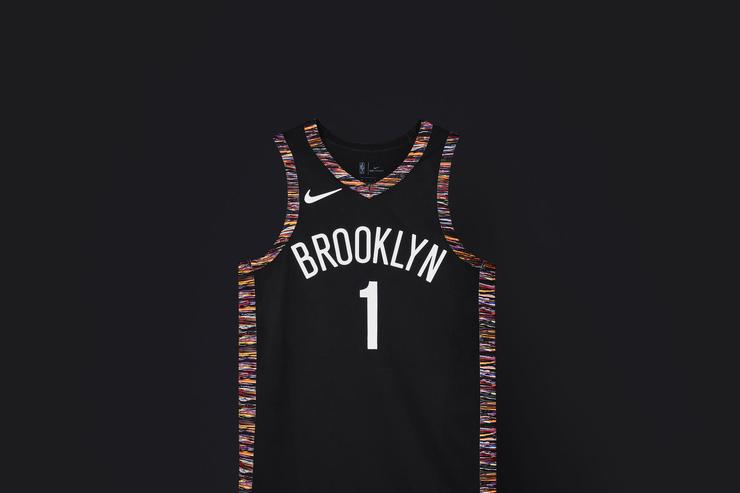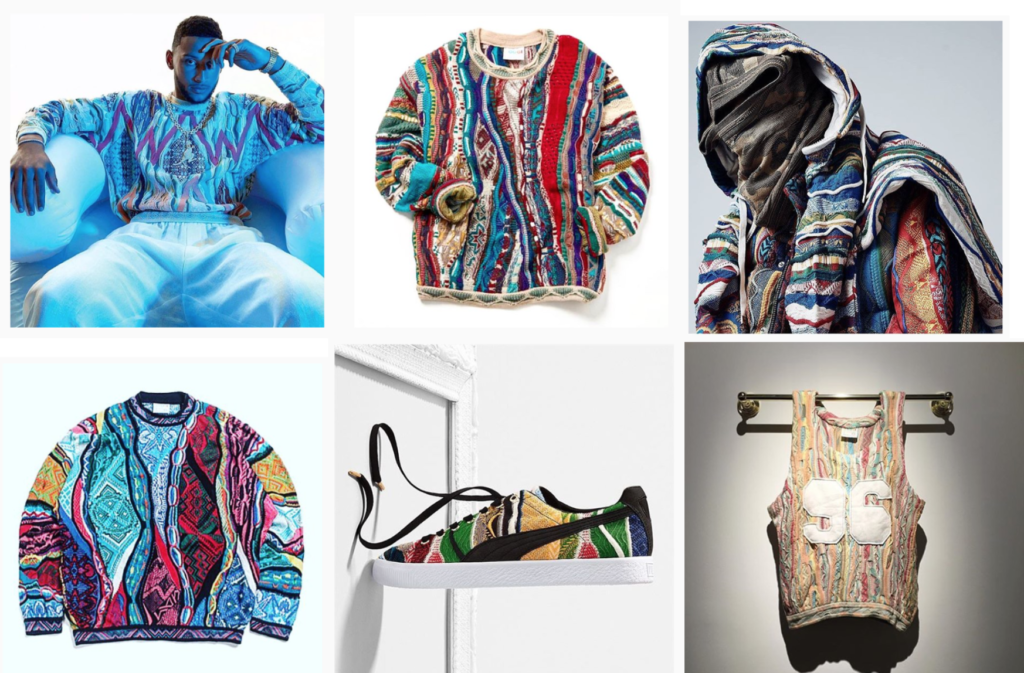Nike, the NBA, the Brooklyn Nets, and New Era have not stopped adorning jerseys, hats, skateboards, keychains, pins, and sandals with Coogi’s legally-protected pattern since it filed suit against them in February, the sweater-maker argues. Instead, in addition to disclaiming liability in the motion to dismiss that they filed in July, the sports titans have argued that actually, Coogi is the one in the wrong for using the late Notorious B.I.G.’s likeness to boost its brand.
In a new filing this week, Coogi has asked the court to refrain from tossing out the case in its entirety, as despite the defendants’ assertions that its complaint “is replete with dubious theories that in some way seek to articulate a cognizable claim against the Brooklyn Nets’-branded products,” it has adequately pleaded its claims, and thus, the case should move towards a jury trial. This includes, according to Coogi, its claim that its sweater designs are protected by trade dress and that the defendants infringed those rights by putting their “Brooklyn Camo” print all over various products, as well as NBA jerseys.
A subset of trademark law, trade dress provides protection for the overall image of a product, including the color, shape, size, and/or configuration, as long as the design has the same source-identifying capacity as a traditional trademark, such as a brand name or logo, which is not small feat.
The defendants claim that Coogi majorly dropped the ball in this regard, arguing in their motion to dismiss in May that “Coogi’s claim that its purported trade dress is so famous that, as a matter of law, it merits the enhanced protection of such recognized famous trademarks like APPLE and GOOGLE” – and even the shape of Coca-Cola’s famous glass bottle and the appearance of Hermes’ Birkin bag – “is frivolous.”
In claiming trade dress rights in a sweeping array of its individual sweater designs, the defendants further argued this spring that Coogi is “attempting to cast a wide net over hundreds of varying designs, [which] is an overreach as a matter of law.”
 image: Nets’ City Edition jersey
image: Nets’ City Edition jersey
And the defendants did not stop there. They also took issue with Coogi’s allegedly improper use of the name and likeness of rapper Notorious B.I.G. in order to boost its brand. In response to Coogi’s initial claim that they have “accentuated their infringement, and have sought to cause consumer confusion as to the origin, sponsorship and/or endorsements of the ‘Brooklyn Camo’ design, by connecting or tying the design” to rapper Notorious B.I.G.,” the defendants called foul.
They claimed in their May 15 motion that “Coogi does not allege that it owns that part—or any part—of Biggie’s persona; nor does it allege that any adoption or endorsement of Coogi products by Biggie was done under license from Coogi.”
To this, Coogi responded this week, accusing the defendants of getting the law wrong. According to the iconic 90’s sweater company, “Biggie became closely associated with Coogi sweaters because he wore them, was repeatedly photographed in them, and sang about Coogi itself in his songs.” As a result of such a “strong and continuing connection between Biggie and Coogi,” which has been further “enhanced by unsolicited promotion in third party [media],” consumers have come to link the two. With that in mind, Coogi claims that the defendants opted to introduce their “Brooklyn Camo” jerseys and other merch “as an alleged tribute to Biggie, knowing full well that it would immediately be connected to and associated with Coogi.” And in fact, Coogi argues, “it was.”
The defendants “appear to argue that Coogi has no right to the fame that has attached as a result of its connection” to the rapper himself, Coogi asserts, and in doing so, says they “seem to be conflating right of publicity law with trademark law.”
Coogi states that “Biggie voluntarily used his right of publicity” – i.e., his right to legally control and profit from the commercial use of his/her name, likeness and persona – “both in photos and in songs to promote Coogi sweaters,” and as a result, “Coogi has every right to benefit from any and all resulting fame.” And in fact, Coogi claims that it does “not need a license with Notorious B.I.G. or his estate,” and, in addition, they do not need to “own any part of Notorious B.I.G.’s persona in order to claim fame and enhancement to the secondary meaning thqt flow from Notorious B.I.G.’s [promotion of its brand and products].”
*The case is Coogi Partners LLC v. NBA Properties Inc. et al, 1:19-cv-01857 (S.D.N.Y.).











